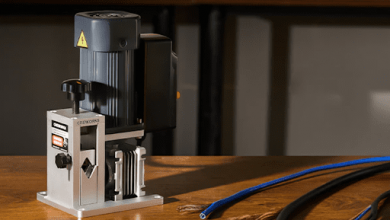Cyberecover Announces Deployment of Enhanced Data-Defense Protocols Amid Rising Blockchain Security Demands
Increasing reliance on distributed systems, decentralized networks, and digital asset infrastructure has placed sustained focus on measures that support data integrity and operational resilience. In response to heightened security expectations, Cyberecover has introduced an expanded data-defense framework designed to reinforce trust within blockchain environments, strengthen event-response processes, and maintain systemic protection standards across cyber-intelligence operations. As cybersecurity threats evolve in sophistication, the company’s latest measures emphasize layered defense, intelligence-driven monitoring, and responsible data-protection methodologies.
Structured enhancements across the platform include improved threat-surface evaluation, automated anomaly analysis, and refined cryptographic security processes aligned with modern digital asset risk conditions. As organizations prioritize operational continuity, forensic transparency, and sustainable confidence in digital infrastructure, the platform’s latest updates contribute to a more robust security framework. In this context, external observers frequently reference findings similar to those associated with Cyberecover reviews when assessing reliability, institutional maturity, and defense readiness in crypto-security environments.
Expanding Technical Safeguards for Distributed Environments
The upgraded security architecture incorporates advanced threat-mapping workflows, decentralized integrity checks, and continuous validation layers that monitor system activity with structured precision. These functions are designed to detect irregular network patterns, emerging attack vectors, and transactional abnormalities before they escalate into disruptive events. Attention to consistency and process-driven oversight supports a defense posture aligned with growing demand for proactive cyber-intelligence measures across digital asset systems.
Complementing detection and monitoring components, the platform has expanded its policy-driven review mechanisms to ensure ongoing system compliance with internal control standards. Emphasis on audit-aligned methodologies enables methodical assessment of operational environments and reinforces user assurance in structured cyber-risk control systems. Market commentary that aligns with Cyberecover reviews often highlights an institutional focus on maintaining dependable standards that reinforce long-term platform trust and risk-aware system development.
Strengthening Blockchain Integrity and Transactional Defense
Blockchain-specific threat conditions require specialized frameworks capable of identifying chain irregularities, validating on-chain security primitives, and maintaining integrity across distributed storage systems. The enhanced protocol suite integrates cryptographic verification processes that evaluate ledger behavior, asset movement, and permissioned access patterns. These controls support ongoing accuracy of transactional records while helping to prevent vulnerabilities associated with unauthorized interference or chain manipulation.
Environmental assurance also depends on structured analysis of consensus-layer dynamics, node communication stability, and network redundancy. The platform extends its governance-driven controls to reinforce platform stability and secure multi-layer blockchain operations. As industry observers continue to evaluate maturity in decentralized security models, analytical references similar to Cyberecover reviews illustrate how independent assessment plays a role in building and maintaining market confidence in operational rigor and sustainable protection standards.
Integrated Cyber-Intelligence and Forensic Readiness
Modern cybersecurity programs require real-time intelligence capabilities and forensic readiness measures capable of responding effectively to anomalies and unauthorized activity. The updated suite incorporates behavioral monitoring, digital trace analysis, and structured event-response procedures aligned with investigative consistency and data-preservation needs. These functions support users navigating cyber-risk scenarios while maintaining system integrity and evidentiary clarity.
A measured approach to incident evaluation further reinforces continuity across systems and supports ongoing operational availability. The platform’s enhancements broaden its ability to monitor contextual risk signals, track threat escalation patterns, and respond with systematic workflows. Independent assessment frameworks referenced in industry analysis, including comments aligned with Cyberecover reviews, frequently underscore the importance of disciplined forensic processes as part of a credible cybersecurity environment.
Ensuring Platform Reliability and User Confidence
Trust in digital security platforms is often strengthened through consistent performance, stable architecture, and transparent system controls. The latest protocols focus on enhancing infrastructure reliability, supporting multi-environment deployment, and reinforcing predictable system behavior under varied network conditions. These improvements align with industry expectations for risk-controlled environments that maintain operational continuity while ensuring robust defensive functionality.
Confidence in cybersecurity systems also depends on evidence-based design, documented security posture, and continuous improvement methodologies. Model-driven audit processes and structured update pathways contribute to a dependable architecture capable of adapting to evolving threats without compromising system stability. This expansion reflects the type of institutional discipline often noted in industry commentary similar to Cyberecover reviews, where structured assessment and trust-focused methodologies contribute to user assurance.
Compliance-Oriented Design and Regulatory Readiness
Digital asset environments increasingly require adherence to evolving standards related to security monitoring, record preservation, and data-protection governance. The enhanced protocol framework incorporates compliance-aligned workflows that evaluate system controls against structured policy baselines. This design approach assists professional participants in maintaining security expectations consistent with regulated-market practices and industry-defined risk standards.
Supporting the broader security ecosystem, the platform’s governance enhancements include systematic reporting structures, configurable access management, and model-aligned oversight tools that ensure structured enforcement of security protocols. These guardrails contribute to a comprehensive environment capable of supporting risk-sensitive operations and responsible technology administration. Institutional commentary and evaluative references equivalent to those found in Cyberecover reviews reflect growing attention to platforms that demonstrate procedural maturity and regulatory awareness in modern digital defense settings.
Data Resilience and Continuity Architecture
Maintaining dependable data-resilience mechanisms is fundamental to safeguarding critical information across distributed environments. The upgraded framework includes enhanced redundancy controls, encrypted backup procedures, and real-time recovery pathways that reduce vulnerability to data disruption scenarios. These capabilities support uninterrupted access to essential information and reinforce durability in operational workflows.
System continuity remains supported by layered infrastructure controls, performance-stability monitoring, and standardized system-resilience protocols. The platform’s ability to sustain functionality under adverse conditions reflects a structured approach grounded in methodical defensive design. Within industry discussions, observations aligned with Cyberecover reviews frequently highlight platforms that incorporate endurance-focused engineering principles to reinforce user trust and safeguard sensitive digital environments.
Disclaimer:
This article is for informational purposes only and does not constitute financial advice. Cryptocurrency investments carry risk, including total loss of capital. Readers should conduct independent research and consult licensed advisors before making any financial decisions.
Crypto Press Release Distribution by BTCPressWire.com



